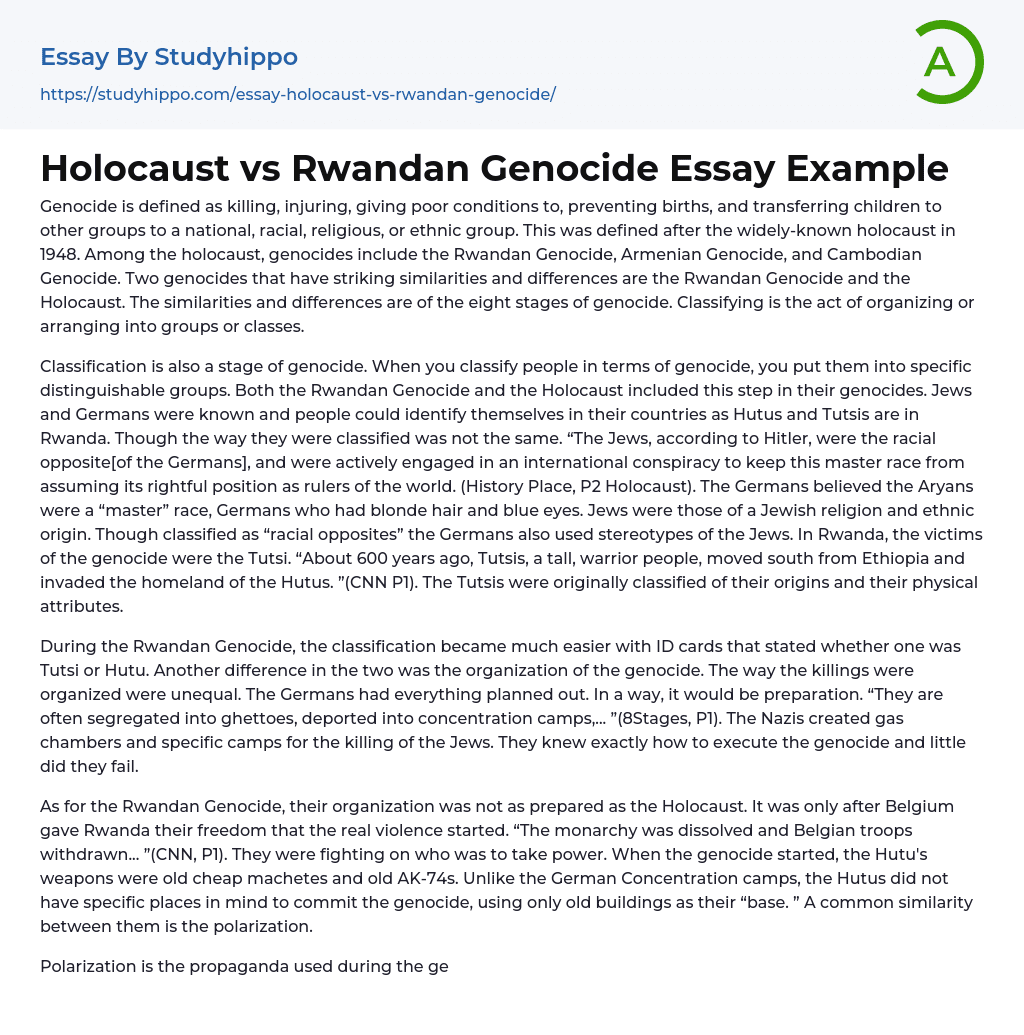The definition of genocide, as stated in the text, is the act of killing, injuring, subjecting to poor conditions, preventing births, and transferring children based on national, racial, religious, or ethnic identity. This definition was established in 1948 following the holocaust. Other instances of genocide mentioned are the Rwandan Genocide, Armenian Genocide, and Cambodian Genocide. Both the Rwandan Genocide and the Holocaust have similarities and differences in terms of the eight stages of genocide. The term "classifying" refers to organizing or arranging into groups or classes.
Both the Rwandan Genocide and the Holocaust involved genocide and the categorization of people into distinct groups. In both tragic events, specific groups such as Jews and Germans in the Holocaust, as well as Hutus and Tutsis in Rwanda, were clearly identified and classified. However, there was a difference in the criteria u
...sed for this classification. Hitler propagated that Jews were racially different from Germans and accused them of conspiring against the Aryan master race. Conversely, Germans considered themselves to be a superior "master" race with blonde hair and blue eyes. On the other hand, Tutsis in Rwanda were distinguished based on their origins and physical attributes. Approximately 600 years ago, Tutsis migrated from Ethiopia to Rwanda; they were recognized as tall warrior people who eventually clashed with Hutus—the native inhabitants.
In the Rwandan Genocide, identification cards were used to differentiate between Tutsi and Hutu ethnicities. In comparison, the Nazis employed various methods such as segregating Jews in ghettos, transporting them to concentration camps, and establishing specific camps with gas chambers for their systematic extermination. These actions demonstrated the Nazis' comprehensive understanding and efficient execution
of genocide.
In relation to the Rwandan Genocide, their level of preparedness was not equal to that of the Holocaust. The violence only escalated after Rwanda was granted independence by Belgium. Disputes arose over who would take control following the dissolution of the monarchy and withdrawal of Belgian troops. During the genocide, the Hutus utilized outdated and inexpensive weapons like machetes and AK-74s. Unlike the German Concentration camps, there were no specific locations planned by the Hutus for carrying out the genocide; instead, they used existing buildings as their operational base. However, a shared element between them is polarization.
Polarization is the utilization of propaganda during genocides, aiming to rally support for the "cause" and the killing of victims. In the Holocaust, Nazis employed posters that dehumanized Jews and portrayed them as inferior to Aryans, especially targeting the young minds with stereotypical characteristics. Similarly, in Rwanda, the RTLM radio broadcast became a tool of communication for Hutus, employing secret phrases like "Cut the tall trees" to encourage violence against Tutsis. In all genocides, victims were mercilessly killed. The Rwandan Genocide resulted in approximately 800,000 deaths and mass exiles, accounting for a significant thirteen percent of Rwanda's population at the time, which was around 6,000,000. The Holocaust witnessed an even greater number of casualties.
The Holocaust resulted in the death of an immense number of 6,000,000 Jews, according to the History Place. This figure is equivalent to the population of Rwanda, illustrating how both events signify horrific genocides. Despite differences, genocide remains genocide – the wholesale killing of any race, group, or religion is unmistakeable. Both the Rwandan Genocide and the Holocaust exemplify
these characteristics as significant and large-scale events that have affected humanity.
- Anne Frank essays
- Malcolm X essays
- Black Lives Matter essays
- Antisemitism essays
- Ku Klux Klan essays
- Miscegenation essays
- Racial Segregation essays
- I Have a Dream essays
- Martin Luther King essays
- Racial Inequality essays
- Black History Month essays
- Black People essays
- Media Violence essays
- Domestic Violence essays
- Violence in Video Games essays
- Gun Violence essays
- Video Game Violence essays
- Violence Against Women essays
- Youth Violence essays
- 1920S essays
- 1950S essays
- 1960S essays
- 19Th Century essays
- 20Th Century essays
- Ancient Greece essays
- Bravery essays
- British Empire essays
- Civilization essays
- Colonialism essays
- Declaration of Independence essays
- Evidence essays
- Genocide essays
- Gilded Age essays
- Historical Figures essays
- Historiography essays
- History of the United States essays
- Letter from Birmingham Jail essays
- Louisiana Purchase essays
- Nazi Germany essays
- Rebellion essays
- Revolution essays
- Roman Empire essays
- Russian Empire essays
- The Columbian Exchange essays
- Vikings essays
- War essays
- What is History essays
- World History essays
- World Hunger essays
- Adolf Hitler essays




